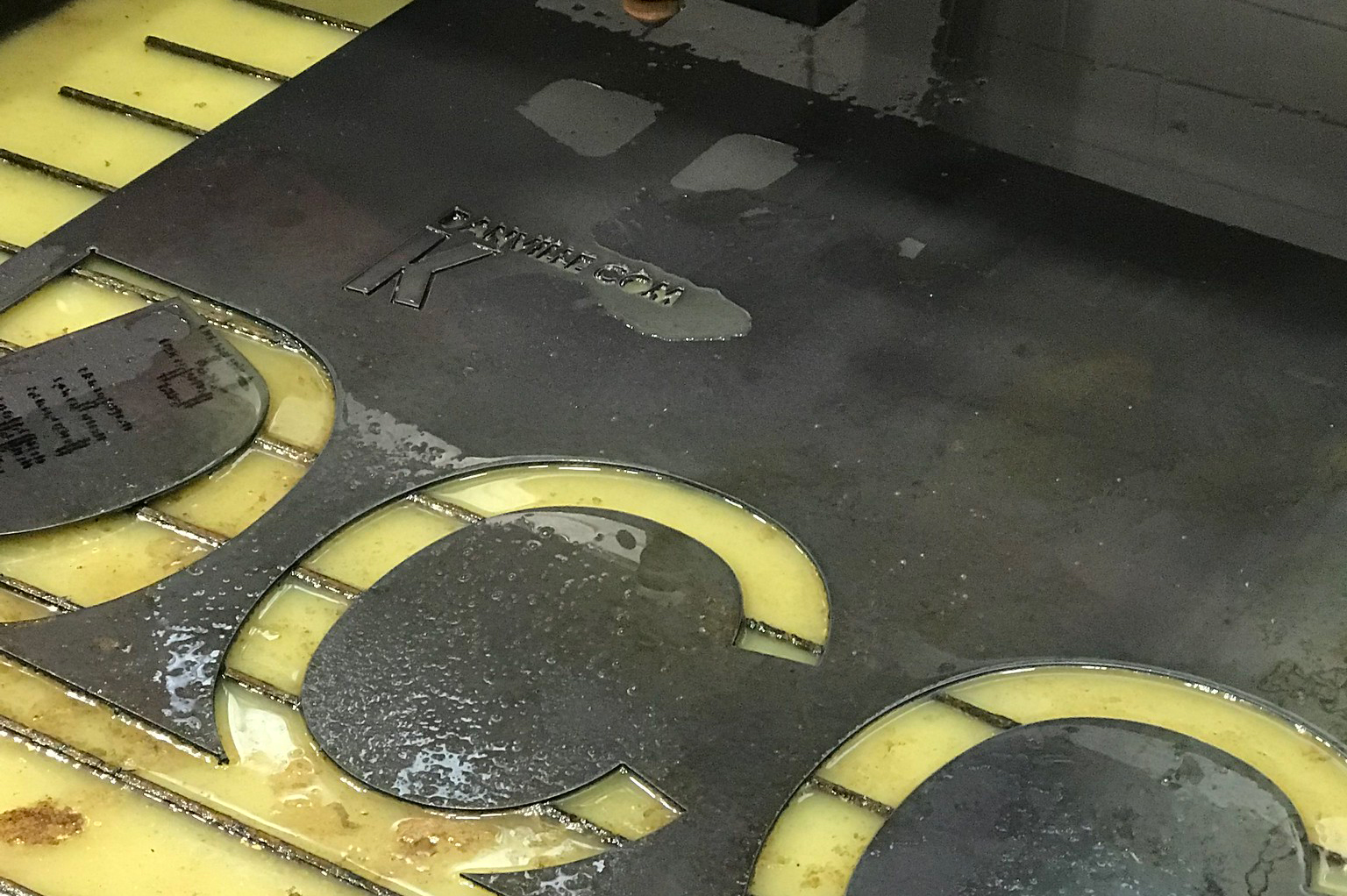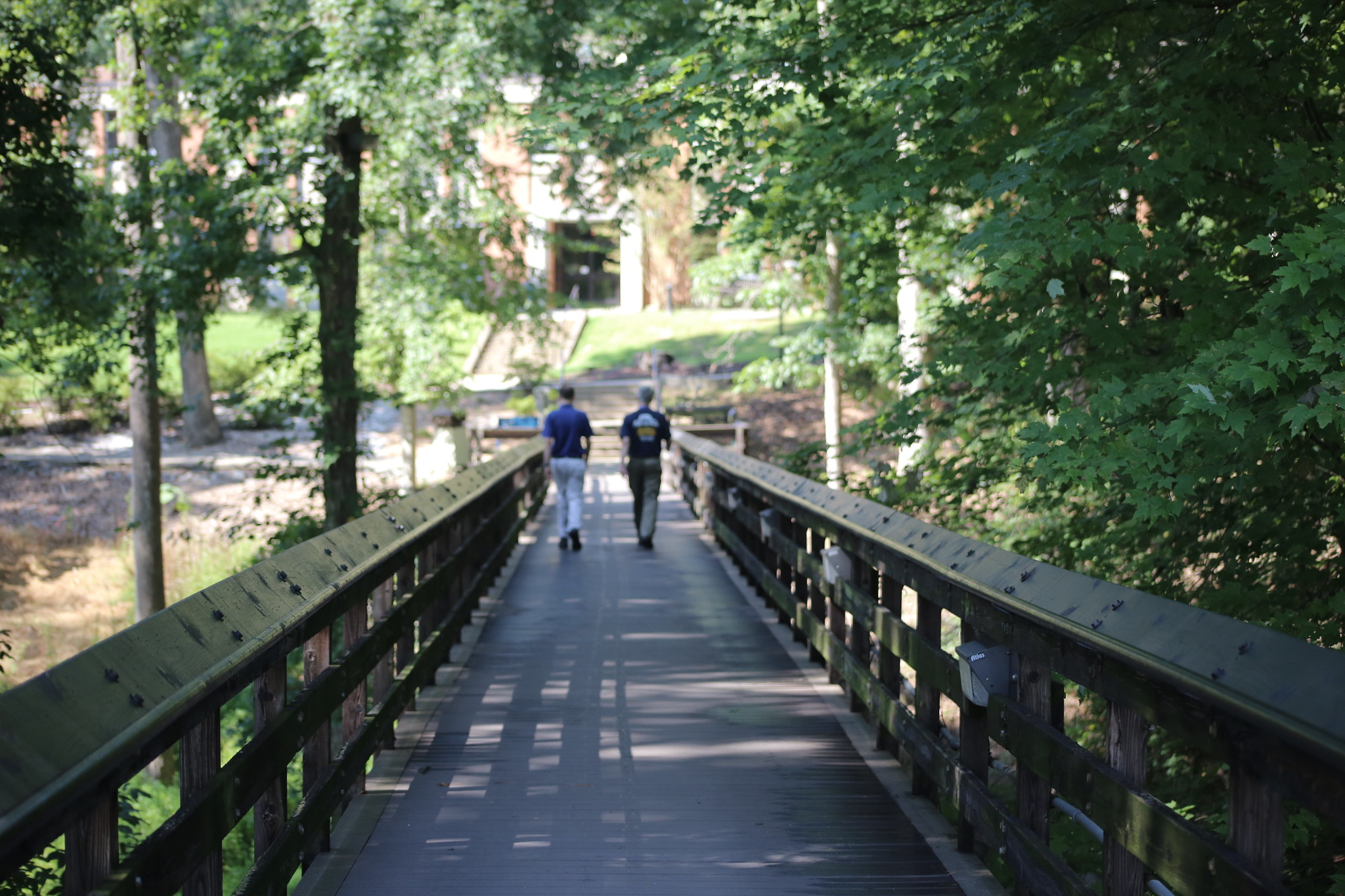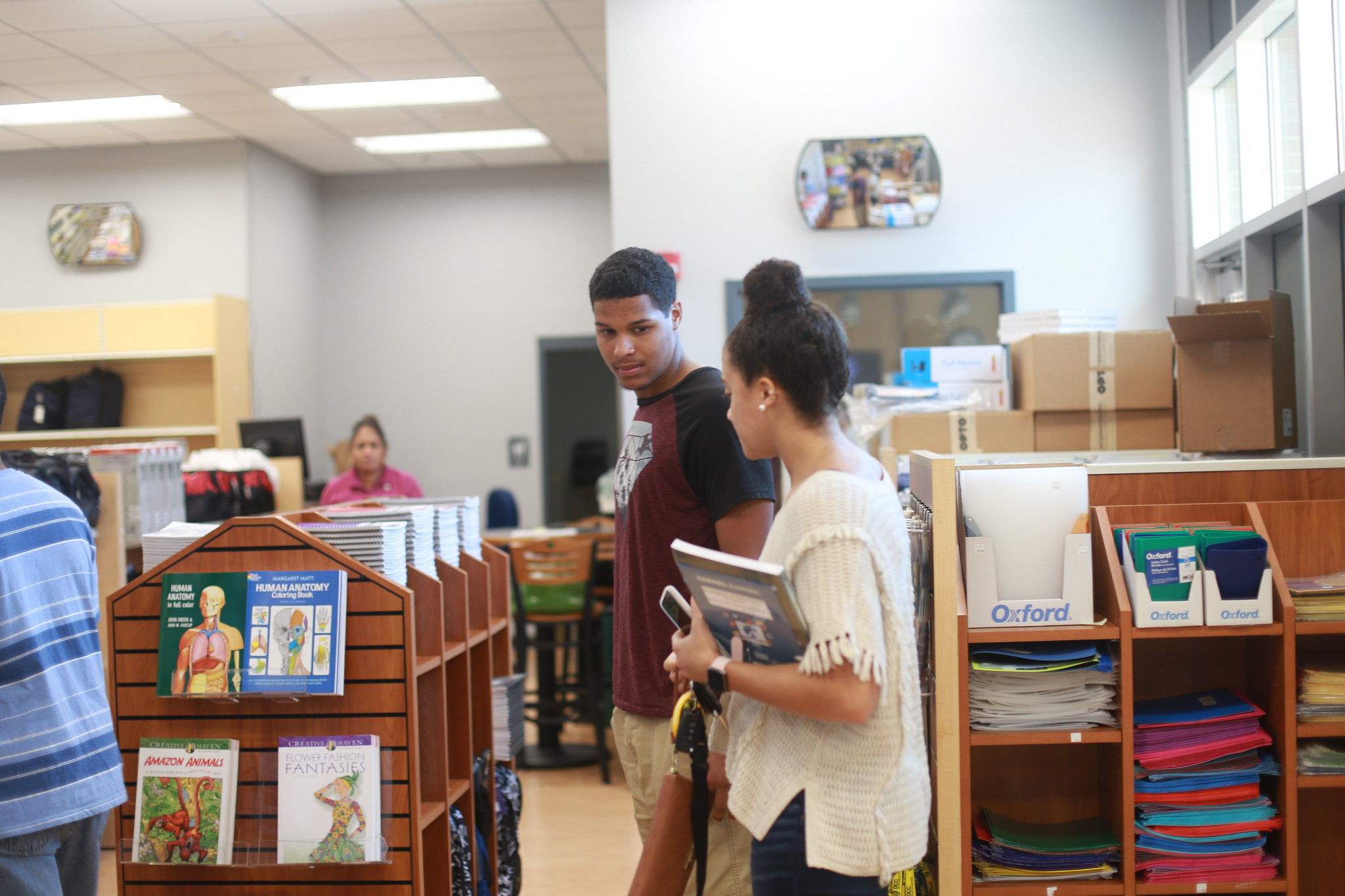Storm Water management is now an integral part of our interaction with our environment. As students, faculty and staff, our most common daily activities can have an unhealthy impact on Virginia’s waterways. Every time that it rains, everything we leave on the streets, parking lots and lawns washes through our ditches and storm drains into our streams, rivers, and lakes. What the rain washes away (known as storm water runoff) can pick up chemicals, dirt, debris and other pollutants that flow in the College’s storm sewer system.
Polluted storm water runoff effects the environment we live in through the following pathways:
Sediment – sediment clouds the water and makes it difficult or impossible for aquatic plants to grow.
Bacteria (and other pathogens) – bacteria and other harmful microorganisms can wash into swimming areas and create health hazards..
Debris – debris such as plastic bags, bottles and cigarette butts that are washed into bodies of water can choke, suffocate or disable aquatic life.
Hazardous Waste – hazardous waste such as insecticides, pesticides, motor oil and anti-freeze can poison aquatic life. Land animals and people can become sick from eating diseased fish and shellfish or ingesting polluted water.
For developed areas, like DCC’s campus, natural conditions are changed by creating large areas of impermeable surfaces, such as roads, buildings, and parking lots. The water that would normally infiltrate into the ground now runs off these impermeable surfaces and enters storm sewers where it then flows to adjacent streams, rivers and lakes. If we are not mindful of what we leave behind, pollutants such as automobile oil, grease, sediment from construction sites, bacteria from animal waste, excess lawn care fertilizers and pesticides will be discharged into our storm sewer system and the water sources that we use for drinking water, swimming and fishing.
Storm Water Regulations
Storm water draining from our campus is collected by an individual storm sewer system that functions independently of Danville’s city system. These systems are regulated as small municipal separate storm sewer systems (MS4s) by the Environmental Protection Agency (EPA) and the Commonwealth of Virginia. Pursuant to the Virginia Storm Water Management Program (VSMP) and Storm Water Management Act. The College is registered to obtain coverage under the General Permit for Storm Water Discharges of Storm Water from Small Municipal Separate Storm Water Systems. The general MS4 permit authorized DCC’s storm sewer system to discharge into surface waters within Virginia state boundaries.
Related Documents
DCC Stormwater Coverage Letter
DCC MS4 Program Overview for Audit Facilitation 2025
Danville Community College General Storm Water Discharge Permit
Map of DCC Campus Storm Water Structures and Outfalls
Danville Community College MS4 Program Plan 2023 - 2028
Danville Community College MS4 Policy & Procedures Handbook 2024
Municipal Separate Storm Sewer System (MS4) Annual Report | Fiscal Year 2019
Municipal Separate Storm Sewer System (MS4) Annual Report | Fiscal Year 2020
Municipal Separate Storm Sewer System (MS4) Annual Report | Fiscal Year 2021
Municipal Separate Storm Sewer System (MS4) Annual Report | Fiscal Year 2022
Municipal Separate Storm Sewer System (MS4) Annual Report | Fiscal Year 2023
VCCS 2024 Annual Standards and Specifications
VDEQ - S&S Agreement for VCCS - Letter
Annual Modifications
Danville Community College reviews and updates its program plan annually. A summary of the program modifications incorporated into the most recent plan and the updated plan are available below:
We invite your comments and feedback on the plan and modifications to the plan. See the Feedback section below to contact us.
Faculty and Staff
As faculty and staff at DCC, we have the responsibility to be good stewards of the campuses natural resources. By being mindful of how potential pollutants are handled and stored, we can successfully prevent storm water pollution and improve the quality of water in our streams, lakes and rivers.
Below are some suggestions that you can implement as faculty and staff at DCC. We hope that you will help us keep our waterways clean.
When using chemical fertilizers, pesticides or herbicides, use them sparingly and follow the label directions carefully. Never apply fertilizers or pesticides when a heavy rain is forecast.
Make use of recycling programs for paper, aluminum, plastics and electronics.
Recycle or properly dispose of used motor oil and other hazardous wastes. One quart of motor oil can contaminate up to 250,000 gallons of water!
Keep leaves, grass clipping, soaps, litter and harmful chemicals away from streets, ditches, storm drains and waterways. The added nutrients and toxins present in those products contribute to harmful algae blooms and fish kills.
Group plants by water needs to make watering more efficient.
Make sure students working in labs have been trained in proper lab techniques and waste disposal. Make sure the students understand potential problems which may arise as a result of chemical interactions or accidentally mixing the wrong chemicals.
Keep up with the maintenance of campus equipment and vehicles. Catching leaks early prevents oil, antifreeze and other contaminants from spilling onto the ground and contaminating storm water runoff.
Students
Making a commitment to change at least one habit that contributes to storm water pollution can result in benefits to our water resources that will be shared by the DCC community as a whole.
We hope that you will implement the suggestions offered.
Place litter, including cigarette butts, in trash receptacles. Never throw litter in streets or down storm drains.
Make use of recycling programs for paper, aluminum and plastics.
Report leaking faucets or running toilets to maintenance staff. Decreasing water usage, you can help prevent the sewer system from overloading and contaminating ground water and surface water.
Get involved in the planning and zoning process in your community. That’s where the decisions are made that shape the course of development and the future quality of our environment.
Regular tune-ups and inspections can help keep automotive waste and byproducts from contaminating runoff.
Participate in clean-up activities on campus and in the surrounding community.
Write or call your elected representatives to inform them about your concerns and encourage legislation to protect water resources.
Get involved in local planning and zoning decisions and encourage your local officials to develop erosion and sediment control ordinances.
Form student groups to promote environmental education. Help educate people in your college and surrounding community about ways in which they can help protect water quality.
Illicit Discharges are Prohibited on Campus
An illicit discharge is anything that goes “down the drain” (curb inlet, drainage ditch, directly discharged to a stream, etc.) that is not entirely composed of stormwater. When source pollutants are introduced and mix with the stormwater, you then have an illicit discharge to the storm sewer system – which drains directly to our surface waters. Stormwater is not treated before entering our local surface waters such as creeks and streams. An illicit discharge can occur as a result of improper disposal and spills of potential pollutant sources and pollution from land disturbance. Common pollutant sources associated with illicit discharge are listed below.
Common pollutant sources that can contribute to an illicit discharge.
- Automotive fluids (oil, fuel, antifreeze)
- Animal carcasses (bacteria)
- Cooking oil and grease
- Chemical cleansers (e.g. detergents, soaps)
- Dumpster leachate
- Misuse of fertilizer
- Misuse of pesticides & herbicides
- Landscaping waste (i.e. grass clippings)
- Paints
- Pet waste (bacteria)
- Solvents (i.e. acetone, ethanol)
- Salt and other deicing agents
- Sanitary sewer overflows
- Sediment (i.e. stockpiles, erosion)
- Trash
- Vehicle/equipment washwater
DCC policy prohibits non-stormwater (illicit) discharges, including illegal dumping, into the college’s storm sewer system. Elimination of any sources of an illicit discharge and enforcement of the prohibition is implemented utilizing language within the Standards of Conduct for DCC employees and Student Handbook for DCC students. Disciplinary action, including restitution, can be taken by the college in cases of negligent, willful or continued cause of illicit discharge.
Exempt discharges not typically considered as sources of an illicit discharge.
- Water line flushing
- Landscape irrigation
- Diverted stream flows
- Rising ground waters
- Uncontaminated ground water infiltration
- Uncontaminated pumped ground water
- Discharges from potable water sources
- Foundation drains
- Dechlorinated swimming pool discharges
- Air conditioning condensation
- Irrigation water
- Springs
- Water from crawl space pumps
- Footing drains
- Lawn watering
- Individual residential car washing
- Flows from riparian habitats and wetlands
- Street wash water
Reporting a pollution concern or an illicit discharge
We can all help to keep pollution out of our local creeks and streams. If you observe an illicit discharge or a potential pollutant source such as an animal carcass, open dumpster, sediment from a construction site or other type of pollutant that could be exposed to stormwater, please call or email to report to DCC using the information below:
Pollution Hotline: (434-797-8427 and stormwater@danville.edu)
When reporting, please provide the:
- Date of the observed potential or occurring illicit discharge
- Location of the observed potential or occurring illicit discharge; and
- Pollutant source, if known (i.e. spilled paint, trash, etc.)
Storm Water Links
Department of Environmental Quality (Storm Water Management)
Department of Environmental Quality (Storm Water Management Permits)
Department of Environmental Quality Protecting Virginia's Environment
Local Links
City of Danville Storm Water Management Program
City of Danville MS4 Program Plan
Environmental Organizations
Feedback
Danville Community College encourages your input and feedback on our Storm Water Plan. If you would like to contact us about our plan, please use the following link to send us an email:
stormwater@danville.edu
We will review your comments and suggestions and modify our Storm Water program where appropriate. Please provide your contact information if you would like us to respond to you personally. We’ll do our best to review your comments and get back to you right away.







